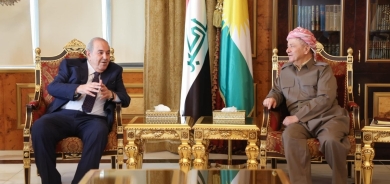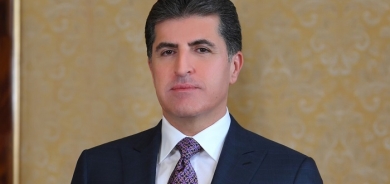Nazar Janabi to Gulan Magazine:His Excellency the KRG president had said that if we see these rights of the people of Kurdistan jeopardized we will go back to our people to ask them
April 11, 2012
Exclusive Interviews

Nazar Janabi is a Next Generation fellow at The Washington Institute for Near East Policy focusing on Iraqi and Middle Eastern security issues and democratization in the region.A former Iraqi army officer and an engineer by training, Mr. Janabi served from 2004 to 2006 as director general for defense policy and requirements in the Iraqi Ministry of Defense. Mr. Janabi was chiefly responsible for managing a policy and requirements department and providing strategic advice to the new Iraqi armed forces. He also maintained Ministry of Defense relations with the UN and NATO countries and negotiated budget appropriations with the Iraqi parliament and government. As a member of an eight-person committee tasked by Iraq's interim government with drafting the country's postwar national security strategy, Mr. Janabi helped to establish the Ministry of Defense's chain of command. Mr. Janabi was one of the researchers who’s attended the seminar presented by the President Barzani at The Washington Institute for Near East Policy, therefore we contacted Mr. Janabi to take his views as an Iraqi and as an academic researcher within The Washington Institute for Near East Policy, we discussed with Mr. Janabi the current situation in Iraq and the importance of the President Barzani’s visit to Washington, and he replied to our questions in an exclusive interview to Gulan Magazine as the following:* Since the withdrawal of US forces, Iraqi political process is suffering from instability and the prime minister is heading toward dictatorial ruling, problems and heading toward dictatorship is collapsing Iraq. According to your opinion please; how is it possible to avoid the prime minister to become dictator in Iraq?
- It is essential that all partners in the political process work together to avoid falling back on the old ways of concentrating all powers in one party or one person, rising above sectarian interests and standing strong on the principles of separation of powers between the executive, legislative and judiciary is key. moreover, we have noticed that political parties -including Kurdish ones- have compromised on principles at some point in the process and it had led to where we are now - getting dangerously close to one party rule-. I believe that all political parties should work together to prevent the central government from going down this path and since the media is being manipulated by the central government, we should reach out and explain our position -as the democratic and freedom loving forces in Iraq- to all factions of the country and not let our efforts be painted as anti any faction but instead as willingness to share the successes Kurdistan had accomplished in the past few years with the whole country.
* In the past: only Al-Iraqia list, which is headed by Ayad Allawi, used to have problems with the prime minister Maliki, but currently Kurds also face many problems with the central government in which the relations between Kurds and Baghdad are about to collapse completely. In your view; to what extend the cutoff of relations between Kurds and Baghdad will endanger the future of Iraq?
- This is typical of the beginning of any dictatorship, it prioritizes opponents and when it feels that one opponent is down it moves to the next and so on till they are the only one standing. Iraqia, due to its success in last elections was the apparent opponent and after manipulating the judiciary into robbing them out of a clear electoral win and driving a wedge between them and the rest of the political players in the country the central government moved into the next and so on until there will be only one power ruling the country.
since 2003, Kurds where the counter-weight to all attempts to revert to dictatorship in Iraq; and on them now lies the historic role of protecting Iraq's young democracy from attempts to divert it from its path. Working together with all factions of the Iraqi political spectrum along with regional and international players to strike a delicate balance and insure a smooth and peaceful transition of power to a new government that will provide services and root-out the rampant corruption in the central government will ensure lasting peace and prosperity for all Iraqis.
* In this week Barzani, president of Kurdistan region, met with president Barrack O'bamma and they mainly discussed problems of Iraq and relations between Kurds and Baghdad. To what extend United States is worried about the problems of Baghdad, Kurds and Iraq?
- The current administration in the United States is occupied on multiple fronts, internally with the down-turn in the US economy and the presidential elections towards the end of next year; and externally with the Iranian nuclear program and a potential of an Israeli strike to deter Iran from acquiring a nuclear weapon capability. The last thing the US wants to see now is a stirring up of the situation in Iraq, However, if the Iraqis work together within constitutional mechanisms to introduce peaceful transition of power; the US will not oppose it since it will be an Iraqi decision and will help prove the success of the US in instilling the democratic values of peaceful transfer of power in the middle east. I had the chance to ask H.E. President Barzani about this, his answer was "any change has to come from within Iraq and by Iraqis" which assures me of a thorough understanding of the geo-political realities of the situation combined with willingness to work with multiple partners to achieve that transition.
* Iraqi Kurdistan region is still recognized as the safe Iraq and it is gate for trading and investment in Iraq, this region is threatened by the central government and has been made to face problems. To what extend the threats by the central government may increase the risk of another war between Kurds and Iraqi government?
- Indeed, Kurdistan is considered the gateway to Iraq and has the highest GDP per capita in the country with thriving private sector and pouring investment, and it seems that these threats -at least for the time being - are empty threats! However, with the growing military capabilities of the central government and the absence of full understanding of the realities of partnership the current empty threats could materialize into a real and strategic threats to the otherwise peaceful and economically thriving society. It could also be a hindering economic obstacle for foreign investment in the region leading to a stagnation in the high growth rate the region is witnessing.
* If United States doesn't stop returning back to dictatorship, it would mean that it has changed a dictatorship with another. Did United States occupy Iraq so as to topple the dictatorship and to have another one in place?
- As President Barzani made it clear in Washington DC, the solution must be Iraqi. The United States and other freedom loving forces in the region and international community will be accepting of a solution that does not involve bloodshed and works within the constitutional parameters, the current conditions are very suitable for such change since most of the political factions in Iraq feels disenfranchised by the current tendencies of the central government. It is time for Kurds to play a historical role in bringing these factions together and stop the current deterioration in a trans-sectarian alliance that is built on the common goals of freedom and prosperity for all the people of Iraq and rising beyond the narrow and shortsightedness views of one party or one faction.
* Last Question: How do you see the future of Kurds within Iraq especially if the central government doesn't resolve its problems with the Kurds?
- The Kurds paid for the liberties they enjoy now with the blood of courageous sons of Kurdistan for generations , moreover, they have consistently demonstrated willingness to be the cornerstone for democracy in the whole country not just Kurdistan. H.E. KRG president had said that if we see these rights of the people of Kurdistan jeopardized we will go back to our people to ask them and representative of the people we will act in accordance of what our public want, after all isn't this what democracy is all about?















